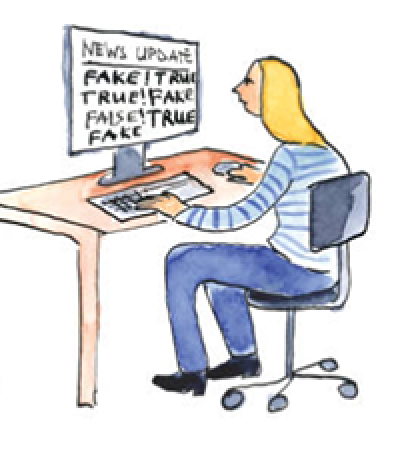Information literacy and media literacy are crucial to student learning. As we have advocated in past blog posts, the process of teaching skills to produce media literate students starts in kindergarten and continues throughout their years as lifelong learners.
“Information literacy advocate" is a term we often use to describe ourselves. We understand the research process, what it takes to evaluate resources for validity, and are quite passionate about developing ethical researchers. So how can we make sure those skills find their way into the classroom?
Why engage teachers in the information literacy conversation?

In recent years, the trend in education has been to outfit students with one-to-one devices within the classroom. While some districts may not be going one-to-one, the trend toward classroom carts of devices such as laptops and tablets is undeniable.
Because of this shift, school librarians are having to rethink ways to promote, market, advertise and advocate for the library program. School librarians must engage educators in conversations about the benefits of strong information literacy programming in collaboration with a librarian.
Too often, school librarians see teachers content with receiving a completed final project in which the research process is not playing a role in learning. Busy educators are sometimes happy to accept that students Googled their sources rather than engaged in true research. This practice is not preparing our students for post-secondary success.
School librarians have loads of programming to offer. But how do we collaborate with educators if we are not being included in the research process and in the development of projects?
The answer: We flip the script. To paraphrase a proverb, if the educators won’t come to you, you go to the educators.
Programming ideas
Here are some ideas for meeting your educators halfway.
- Meet the educators (literally) where they are: in their classroom! Offer to come collaborate in their space.
- Attend department meetings and planning sessions. The best advertisement for collaboration is your willingness to share your knowledge and resources. We have found that being a part of department meetings easily supports the collaboration process.
- Make sure information literacy skills are seamlessly integrated into the curriculum. This is where the school librarian must know the curriculum. As librarians must be able to engage with educators and encourage these skills.
- Encourage students to overcome their need for “instant gratification.” Students are more likely to resist the temptation to quickly find one answer instead of the best answer if they know that strong information literacy skills are expected of them by their teacher and the school librarian.
- Make sure all stakeholders have a clear understanding of what constitutes information literacy. This might mean providing professional development to the educators in your building or having informal conversations.
- Create reusable resources that support teachers and the research process. For example: database and subject research guides, citation how-tos and rubrics that support the research process.
- Share with educators and stakeholders how libraries, school librarians and integrating information literacy into the curriculum supports critical thinking and academic success.
- Support educators by creating graphic organizers that help students evaluate and organize the information they find. One of our biggest obstacles is time and teachers' willingness to allow time for critical selection, evaluation and questioning of resources.
- Be a permanent part of your faculty meeting’s agenda. Continue to share, market and advertise the school library, your expertise and your resources.
- Hold after-school research support sessions or information literacy sessions at your school. It doesn’t hurt to offer food. Popcorn or chips and salsa can entice even the most reluctant participant.
As our students wade through our information and misinformation landscape, it is important that students are skilled researchers. Knowing that students exit our schools able to think critically, make informed opinions and use a variety of resources to ethically answer their information needs is key.



